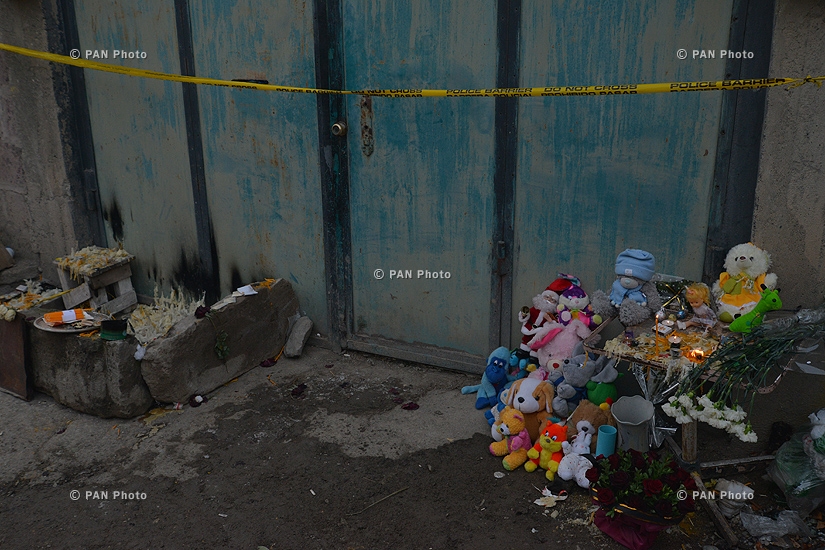
Gyumri-based news outlets worked with great vigor in the days following the January 12 murder of the Avetisyan family in Gyumri. They became a source of information for not only Armenian, but also foreign news outlets.
“For me, the stress was in not completely managing, because I was working alone and had to not only check the information, but also go to press conferences and different meetings related to the incident. I have years of reporting experience: I understood when to wait and when to report the news immediately,” says Hetq’s Gyumri correspondent Yeranuhi Soghoyan.
Added to the workload was the psychological stress.
“I think there is a link here with feminine emotions. For two days I cried at dawn. I understood that I have to discharge with the emotions so that I could continue to work,” says the Hetq correspondent.
The number of visits to Gyumri-based Shirak Centre‘s website increased by several dozen during the days of the tragedy. The NGO’s website had visitors from not only Armenia, but also abroad.
“We were a source for both Armenian and foreign news outlets. This coverage was distinguished by the fact that it required swiftness. The events developed very rapidly; everything had to be done quickly; there was no time. Because of this, the materials suffered to some extent because we worked less on them. From the scene, we uploaded material immediately on the website,” says Shirak Centre President Vahan Tumasyan.
According to him, the emotions running high in Gyumri also affected journalists and their news coverage.
“This was such a huge tragedy that it couldn’t not affect anyone — whether he is a journalist, clergyman, or police officer. There was emotion in the stories of all news outlets working in Gyumri: along with the actual information, personal opinions were expressed, emotional words were used. There was emotion in our material too,” says Tumasyan.
Tsayg TV reporter Nazeli Elbakyan says she tried to do everything possible for the emotions not to influence her news stories, though she regularly shed tears while reporting.
“When I arrived on the scene, I couldn’t utter a word to determine whether what I heard was right or not. While reporting information by phone live from the scene, I cried involuntarily. I was so affected, that I even said the name of the street and the address wrong a few times. In the church too, neither the camera operator nor I could bear it; at one point, we turned around so no one could see us; we cried hard and then returned to the task at hand. It was horrible: I still haven’t recovered,” says Elbakyan.
Tsayg TV camera operator Artur Margaryan, who worked with Elbakyan during those days, filmed the Avetisyan family requiem with his eyes shut.
“I’m extremely afraid of corpses, but during those days I went, did my work, and the footage didn’t suffer from filming with shut eyes,” he says.
Elbakyan says that what was terrible was not only what happened, but also the responsibility she felt toward the audience.
“You realize that so many TV stations and viewers are expecting information, images, and interviews from you. I was talking on several phones simultaneously — they were calling [me] from Armenia TV, h2, Yerkir Media, and there was live streaming regularly on Tsayg TV,” she says.
It was due to this sense of responsibility that Elbakyan and camera operator Khachatur Gevorgyan went also to cover the protest outside the Russian Consulate in Gyumri, though they had received clear instructions from editorial staff to return to the TV station.
“We decided that when they call from the editorial office, we’ll say that the roads are blocked, and that’s why we’re running late. When they called and asked ‘Where are you?’, we said, ‘On the road.’ They said, ‘Is that why we’re seeing you live on air?’ It was dangerous. We were forced to turn back, but the desire to report was great,” says Elbakyan.
“During the protest, we thought about both our and the equipment’s safety because rocks were flying over our heads. Several news outlets’ equipment was damaged. A few of the rocks also grazed us,” says Margaryan.
Gyumri journalists with their cameras and tripods also blocked the path of the investigative committee’s vehicles, when after waiting for several hours the investigative committee’s cars left the Russian military base in Gyumri without providing any explanations.
“When we blocked the vehicles’ path, security officers approached [us] and said, ‘You’re disrupting order; you have no right.’ Until [Investigative Committee of the Republic of Armenia spokesperson] Sona Truzyan didn’t get out of the car to give an interview, we didn’t open the road,” says Margaryan.
During those very important days for their city, Gyumri journalists cooperated with their colleagues from Yerevan, helped them get oriented in the area, guided or accompanied them to the scene, and provided information. The solidary and tense work united journalists.
Anna Barseghyan


Add new comment
Comments by Media.am readers become public after moderation. We urge our readers not to leave anonymous comments. It’s always nice to know with whom one is speaking.
We do not publish comments that contain profanities, non-normative lexicon, personal attacks or threats. We do not publish comments that spread hate.